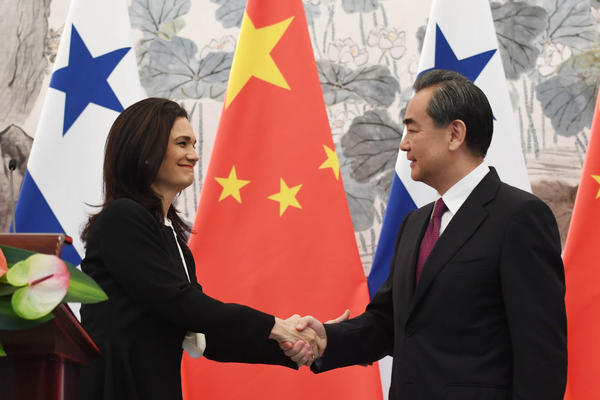
Panama has announced that it is cutting ties with Taiwan and instead establishing relations with China. The shift is a major win for China as it seeks to isolate Taiwan, which now has diplomatic relations with just 20 countries.
China and Panama announced the move in a joint statement, saying it was in the “interest and wishes of both peoples.” The two countries agreed to exchange ambassadors.
“The Government of the Republic of Panama recognizes that there is only one China in the world, the Government of the People’s Republic of China is the only legitimate government representing all of China, and Taiwan is an inalienable part of the Chinese territory,” the statement reads.
“Eleven of the 20 countries left that recognize Taiwan are in Latin America and the Caribbean,” NPR’s Carrie Kahn reported. Of the countries that still have ties, Panama has the largest economy.
The Panama Canal is a crucial waterway for trade. NPR’s Anthony Kuhn reports from Beijing that Panama “is emerging as a hub for China to ship its goods to South America, and Beijing has invested millions of dollars in infrastructure around the Panama Canal.”
China considers Taiwan a breakaway territory, and relations between Beijing and Taipei have recently grown more tense. “Beijing does not trust Taiwan’s President Tsai Ing-wen, whose party has traditionally taken a pro-independence stance,” Anthony says, “so it has used investment and other incentives to lure away Taiwan’s diplomatic partners.”
Taiwan is slamming the shift in ties. Minister of Foreign Affairs David Lee called it “most unfriendly” and said that Panama had been deceitful “until the last moment,” according to the Taipei Times.
Taiwan “strongly protests and condemns Beijing for luring Panama to switch diplomatic ties, squeezing Taiwan’s space in the international community and hurting Taiwanese feelings,” Lee said.
Other countries in the region with ties to Taiwan have issued little response. Guatemala declined to comment, Reuters reported. An official from Honduras, speaking on condition of anonymity, told the news service that the country intended to maintain ties.
Ross Feingold, a senior adviser at D.C. International Advisory, tells The New York Times that Panama was one of Taiwan’s most important allies – and now, “it is very possible that the remaining countries will switch.”
These are the countries that Taiwan still has diplomatic relations with, according to its Ministry of Foreign Affairs:
-
- East Asia and Pacific: Kiribati, Nauru, Solomon Islands, Republic of the Marshall Islands, Republic of Palau, Tuvalu.
- Africa: Burkina Faso, Kingdom of Swaziland
- Europe: Vatican
- Latin America and Caribbean: Belize, El Salvador, Haiti, Nicaragua, St. Kitts and Nevis, St. Vincent & the Grenadines, the Dominican Republic, the Republic of Guatemala, the Republic of Honduras, the Republic of Paraguay, Saint Lucia
Interview: Panama’s deputy FM urges agenda-setting to boost ties with China
Panama’s Deputy Foreign Minister Luis Miguel Hincapie has urged the setting of a diplomatic and political agenda as a next step for the country to boost its fledgling relationship with China, after the two countries established diplomatic relations on June 12.
In a recent interview with Xinhua, Hincapie said the setting of the agenda should include establishment of embassies in each other’s capital city, appointment of ambassadors, and beginning to discuss topics such as trade, maritime affairs, tourism, education and cultural exchange.
According to the minister, these steps are particularly urgent to ratify the “correct, sovereign and positive step” taken by Panama, referring to Panama’s decision to establish diplomatic relations with the People’s Republic of China.
“It was a sovereign decision, taken strategically, which suits us. The benefits will be seen later, when all the agreements and the bilateral relationship are confirmed and established,” Hincapie added.
While Panama has not yet sent an ambassador to the People’s Republic of China, he guaranteed that this would be done before the end of this year. Hincapie said that Panama would seek to move as quickly as possible in this regard, given China’s importance and potential as the second-largest user of the Panama Canal.
The deputy foreign minister said that the possibilities of this new cooperation were “incalculable,” especially since Panama could become China’s gateway to Latin America, with Chinese companies using it as a logistical platform for this region.
Hincapie pointed out several advantages his country enjoys, including its geographical position and its connectivity with other countries by convenient means of transportation such as airlines, ports and railways.
He recognized that the Panama Canal would be a focal point of China-Panama relations, especially with Chinese firms setting up operations there in the near future.
The first ship to go through the expanded Panama Canal on June 26, 2016 was a Chinese ship named “Cosco Shipping Panama”.
“There is already an interest in coming to Panama, and with Chinese ships crossing through Panama, traffic and trade are growing. Beyond having commercial ties with China, the diplomatic relations and formal links open more doors than before,” pointed out Hincapie.
Looking further ahead, the deputy minister believes it will have a knock-on effect with China seeing Panama as a tourism destination.
He also highlighted the importance that China has had in Panama’s history, beginning with the arrival of Chinese immigrants 163 years ago, who later contributed to Panama’s strong economy.